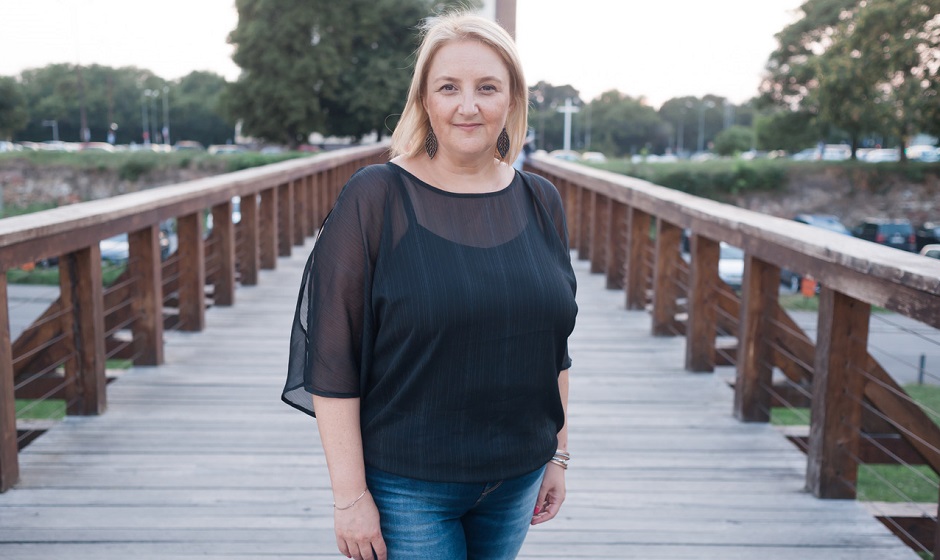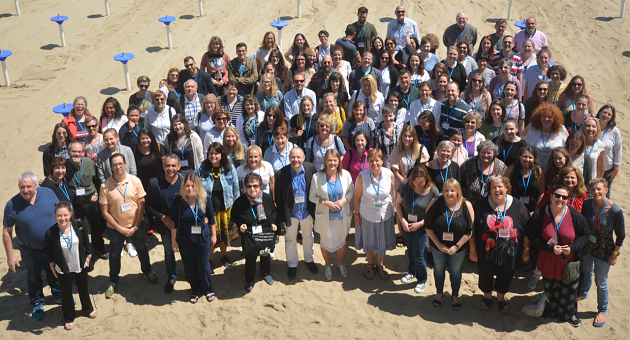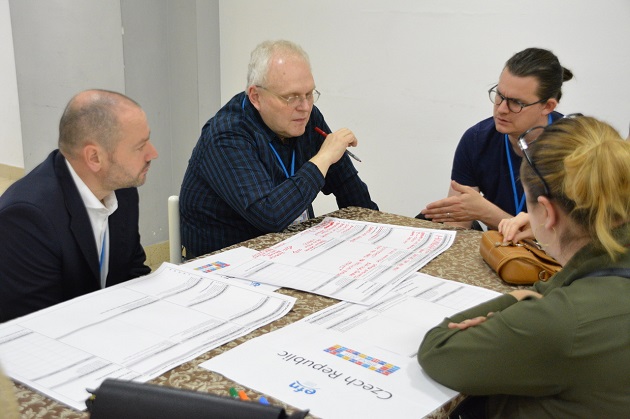‘Traffickers are moving prostitution online – how do we reach the victims now?’
The European Freedom Network will hold its “Bridge Conference” online as anti-trafficking groups learn to adapt to the Covid-19 context. Internet security, the growth of pornography addiction and the increased vulnerability of trafficked women are some of the challenges, says Leanne Rhodes.
LISBON · 02 SEPTEMBER 2020 · 12:25 CET

“Going online” will be the theme of this year’s annual conference (6-8 October) of the European Freedom Network (EFN), a movement of over 250 Christian groups that fight against human trafficking in the continent.
Leanne Rhodes, who lives in Portugal, is the Executive Director of the EFN committee. She told Evangelical Focus about how the work of organisations trying to reach out to trafficking victims has changed substantially after the Covid-19 crisis.
Rhodes refers to some of the findings of a recent OSCE report on technology and human trafficking, which “examines the ways technology can be misused to facilitate trafficking in human beings”.
“There is a massive increase in video sex, chat rooms, creation of pornography and so on, all over the place and very early on as lockdowns started”, she says. Christian organisations and ministries that form the EFN are now re-evaluating their strategies in this new context.

Representatives of European Freedom Network partners at the 2019 Bridge conference. / EFN
Question. In general terms, how has the whole pandemic changed the scenario of human trafficking in Europe?
Answer. It has affected especially those of us who do outreach, those who went into brothels, met women on the street, etc. It is not just that these organisations could no longer do outreach, but they lost contact to people they had been reaching out to. So, a lot of our partners have been worried about what would happen suddenly to the women they had been speaking to. Were the pimps going to dump them? Or house them? What was it going to be for these women to be in lockdown with a pimp? Are pimps going to exploit them further as they went underground?
Particularly in Germany, we have noticed straight away that many women seemed to be going back to their countries. They went back to Romania, to Bulgaria. At the same time, as we watched the online “adult services” adverts, we realised that ads on the internet tripled in a very short time.
So, we have seen that the mafias have moved from street prostitution to online prostitution. There is a massive increase in video sex, chat rooms, creation of pornography and so on, all over the place and very early on as lockdowns started. Sexual exploitation has grown to a bigger scale, because if you can sell people over the internet over and over, you can make more money.
Q. In this context, how should the groups who form the EFN respond?
A. Sometimes it’s difficult for our partners to talk about their work to others. Not everyone understands that you are concerned about people that are forced into prostitution - while everyone else has been worrying about whether they get enough toilet paper or not [laughs].
We have been sending out weekly emails offering to talk about the challenges. We set up a “bridge” group, to support anyone who felt isolated or wanted to talk through how they were dealing with their work. A few connections of people who did not know each other came out of that.
A webinar for all those people doing outreach and those running shelters for victims was set up as well. A medical doctor in Germany and a leader of a network in Italy helped us to reflect about how we deal with this new situation.
We also started looking at how do we do outreach online. A volunteer in Romania who has done a doctorate on internet security helped us have a conversation about the safety concerns related to doing outreach online from our computer at home – of course you need to protect yourself! We were told about firewalls, internet browser extensions, etc. This is to make sure that if they visited prostitution websites to find some of the women they had been in touch before, they would not be backtracked by the mafias.
It is very different going to someone in the street and saying: “Hey, I’m this person and I’m from this organisation, we’d like to help you”, to doing that on the phone. You do not always know who is on the other side of the phone: Is it a pimp? Or is it a girl? We also had to talk through the ethics involved in that. Do you give you name? Or do you pretend to be a potential sex buyer? We worked through scripts about how to introduce yourself, people would try something and then come back to this group and share how it went.
And then there is the issue of protecting yourself, because when you go on to adult sex buying sites you are going to see stuff that you did not when you went into a brothel. The language and the images is much more explicit on the internet, and that is repulsive to you when you care about this women. We spoke about how we do bring accountability in with each other. So, there was a lot to consider, and I am so proud of that group because they are doing all this tough work.
In a few of the countries they are now starting ministries reaching people online. In Spain, for example, they rang up one girl, and she said it was the first time in four years that anyone had offered her help.

Q. You also have an “abolitionist book club”.
A. Yes, it is run by Dr. Glenn Miles, not just for EFN partners but for others as well. They pick a different topic every week, and they send out the latest research on that topic, read it and discuss it. They have addressed secondary trauma, transgender issues, a theology of human trafficking, paedophilia and human trafficking, etc.
People are now responding a lot more to that kind of webinars and online discussions than before the lockdowns.
Q. And now you’re having your first ever online Bridge Conference. How will it be different than other years?
A. We’re making the conference shorter, because people are looking at the screen all day. We try to make it more interactive as well. We are finding ways to mimic things of the in-person conferences such as the networking times. We are asking every participant to send a 1-minute video of a good story they have experienced in the last year, and will be showing those throughout the conference, to inspire one another. There are going to be panels, with several people having a conversation.
But we still will be having some presentations, like that of Kevin Hyland, who was the Lead for the Metropolitan Police Human Trafficking Unit and the UK’s First Independent Anti-Slavery Commissioner. Gene McConell from the US will be with us as well, speaking about pornography. An advantage of the situation now is that we are more easily getting international speakers.
We’re theming our conference this year “Going online”, because trafficking is going online. We are going to talk about the effects of Covid-19 on human trafficking globally. How what is going on in Asia or Africa has an impact on Europe.
We are going to look at links between pornography and trafficking. All the national Evangelical Alliances in Europe are invited to join this session, to think together on how do we get churches speaking about pornography, particularly where it is a very taboo subject. Some pornography platforms are offering free subscriptions, and that means that in the post-coronavirus context we will have a lot more people addicted to pornography. If we do not talk about this issues, we will not be able to deal with them.

Working groups during a EFN conference. / EFNQ. There might be people who read this interview who are not particularly involved in this field, but still want to support your work at the EFN. How can they do it?
A. Of course they can donate, going to our website and clicking on the “donate” button. That is always very helpful.
They also con go to our “Don’t Shut Your Eyes” website if they want to see some of the videos and other resources we have produced. You can share them in your church, or online. The latest video we did was on pornography and the links to human trafficking.
Q. How would you encourage other networks and international movements of Christians in these strange times?
A. I think the key is finding out what the felt needs in your network are, and speaking to those. That is what we have done, we have sort of created a place to talk, and out of that conversations, people have ideas. You can start building new things from there.
Although we are not meeting in the same place, we try to mimic that time of catching up and meeting one another. At the same time, we need to realise that people are working at home with their kids, etc. And therefore understanding that no one is able to join always one hundred per cent.
And another thing is to just minister to the people that you work with. Some weeks someone is going to be feeling ok, and other weeks they will not. We need to be real with one another and support each other through this season.
Learn more details about the 2020 online "Bridge Conference" on the European Freedom Network’s website.
Published in: Evangelical Focus - life & tech - ‘Traffickers are moving prostitution online – how do we reach the victims now?’
